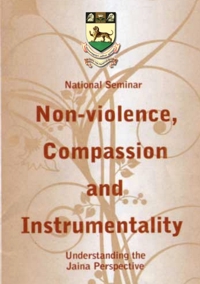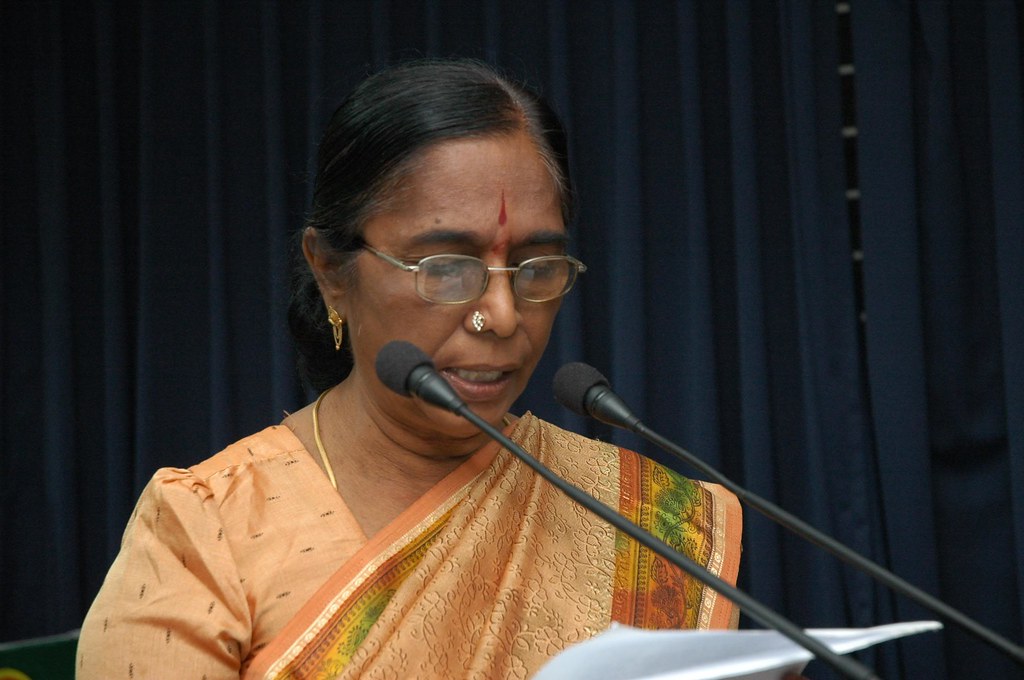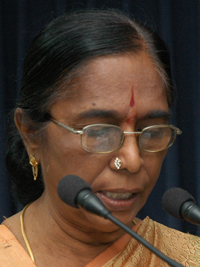 | Non-violence, Compassion and InstrumentalityA Jaina PerspectiveSeminar organized by the Department of Jainology of the University of Madras, 13 and 14 February 2009 Chennai, India |
14.02.2009
2.04 Compassion and Instrumentality
“The best of all possessions is the wealth of compassion. Possession of wealth is found even with the meanest of mankind” This is the meaning of the first couplet of the Tirukkuṛaḷ under the title ‘Compassion.’
What is compassion?
Compassion is one of the greatest human values and the empathetic fellow-feeling experienced by a person when he sees the suffering of other creatures. This is the all-encompassing love that the man of virtue develops in respect to all living creatures in his steady progress towards righteousness. So compassion is the definition of the highest scope of motivation.
Nirvāṇa may be the final object of attainment, but that moment it is difficult to reach. Thus the practical and realistic aim is compassion, a warm heart, serving other people, helping others, respecting others, bringing less selfishness. Even though all religions and philosophies of the world advocate compassion, Jainism has a practical way of emphasizing it. The basic tenet of Jainism is ahiṁsā paramo dharmaḥ. From an ethical point of view dharma means duty. Compassion is the supreme duty of an individual. From the religious point of view dharma means the true nature of a substance. Compassion is the true nature of a human being. The Jain dictum parasparopagaro jīvanam means: Living beings (souls) render service to one another. Ahiṁsā also refers to an active concern and compassion for follow humans and other living beings. In a positive sense Ahiṁsā means caring for and sharing with all living beings as well as tending to, protecting and serving them. It entails universal friendliness (maitri) universal forgiveness (kṣāma) and universal fearlessness (abhaya). In Ācārya Hemachandra’s words:
“Compassion is the beneficent mother of all living beings, the elixir for those who wander in suffering through the ocean of reincarnation’. This positive ahiṁsā is expressed in the form of karuṇa-dāna or abhaya dāna.
Genuine compassion is based not on our own projections and expectations, but rather on the needs of others, irrespective of whether another person is a close friend or an enemy as long as that person wishes for peace and happiness and wishes to overcome suffering then on that basis we develop genuine concern for their problem. Compassion without attachment is possible. Therefore we need to clarify the distinctions between compassion and attachment. True compassion is not just an emotional response but a firm commitment founded on reason. Because of this firm foundation, a truly compassionate attitude towards others does not change even if they behave negatively.
Compassion is any act that relieves suffering, has an intrinsic reality, completely independent of humans, and depends upon understanding suffering
Compassion in this way implies that a person can be neither compassionate nor uncompassionate. Only an act can be compassionate if it is an act of compassion. We do not own compassion. Compassion uses us to act.
Here I can mention a very instructive case. The only son of an industrialist was leaving home for higher studies. Right in front of the father’s eyes a speeding car hit and crushed him. The case went for hearing before a magistrate. It would not have been at all difficult to establish that rash driving caused the boy’s death. The father, however, thought that whereas his son could not be brought back to life, the family of the driver would be drowned in sorrow and ruined if he was sentenced to capital punishment. He therefore told the court that his son had died due to his own mistake and that the driver was not at all responsible for the accident. This act of the father shows his emotional balance. The same can be applied to the doctor couple who donated the organs of their son who met with a road accident recently. From this, we come to a conclusion that compassion is the act of making the types of adjustments to the changes we experience that enables life to go on.
It was this compassion, arising out of the early exposure of Mahatma Gandhi to the racialism of South Africa and to the ignorance, poverty and disease of the millions of this countrymen that led him, through the path of social reform, constructive work and political freedom, to the supreme sacrifice that he consummated at the alter of his own principles and convictions, for the people.
Compassion is an infinite force of nature, which manifests as life
Compassion requires an awareness of the place of an individual in the web and the connections for the individual. This is unlike the personal awareness we considered originally. Unlike that personal awareness - this was part of someone’s hidden, secret life. This awareness belongs to the sphere of shared experiences. It is an awareness of the structure of the web that we all share.
Compassion is exactly the awareness, awareness of our context, relative to the contexts of all our neighbors, within the natural web. It is care for the health, stability and integrity of the web, restoring broken connections, healing the suffering, giving attention to the shared experiences that ripple and pulsate like surges of energy throughout this web.
On the vast plains of the Serengeti in East Africa the summer season brings hot dry weather that depletes the watering holes and rivers, causing a drought. The animals suffer from thirst and spend much time searching for water. Then the season changes and the monsoons come and fill up the streams and holes with drenching rain, providing water in great abundance. Now if instead of the monsoon rains there were a group of people who formed a bucket brigade and hauled water to the watering holes and filled them to relieve the thirst of the animals, it would be easy for us to recognize that action as compassionate. But the effect of the monsoon rain is the same, in fact far more effective. Because we have an awareness of the suffering, we can infer that there is, in some sense an awareness that brings the monsoons also. The source of that awareness may not be apparent to us because it lies too far back in the web, nested too deeply in distant connections, for us to see the source directly. Still it is there and monsoons are an act of compassion. From this it becomes clear that compassion is an infinite force of nature whose manifestation is life itself.
Compassion is a universal convergence point for all religions, all movements, and all people
Compassion is our universal convergence point. Every religion emphasizes compassion as a fundamental tenet in one form or another. Human rights, animal rights, minority rights, every type of rights movement implicitly use compassion as its foundation. Wherever societies flourish and people thrive, compassion is the source of their success. Every person has an understanding of suffering and its relief. It is not a giant leap but only one more small step, to openly embrace compassion above everything else.
Compassion expressed by one to the other must be in such a way that he is only an instrument (nimitta) and not a master or material cause (upādāna)
When a farmer sows his seeds, harvests and feeds the hungry then suffering of hunger is relived. Hence it is an act of compassion. To go a little further farmer would not have his crop if he had not had the fertile soil therefore we must see the soil as an essential element in the act of compassion. If there is no soil there is no compassion. Here seed is the upādāna i.e material cause. Changes take place in the upādāna. It turns to a plant, bears flowers and fruits. But it retains its essential identity (svadravya) It has the attribute of being transformable from a seed to a plant with flowers and fruits.
Though the external nimitta (instrumental agency is) is the farmer, actual nimitta is the soil. Every entity is its own material cause. According to the philosophy of Mahāvīra each entity is solely responsible for its progress or regress.
If compassion is shown either for fame or to gain respect it is not praiseworthy. Apart from that it will be impossible to canalize it in a perfect way. Moreover compassion shown from a kind and empathetic heart works as an antidote to hatred and nurtures goodwill.
Live with compassion.
Work with compassion.
Die with compassion.
Enjoy with compassion.
When problems come, experience them with compassion.

 Dr. R. Rajalakshmni
Dr. R. Rajalakshmni